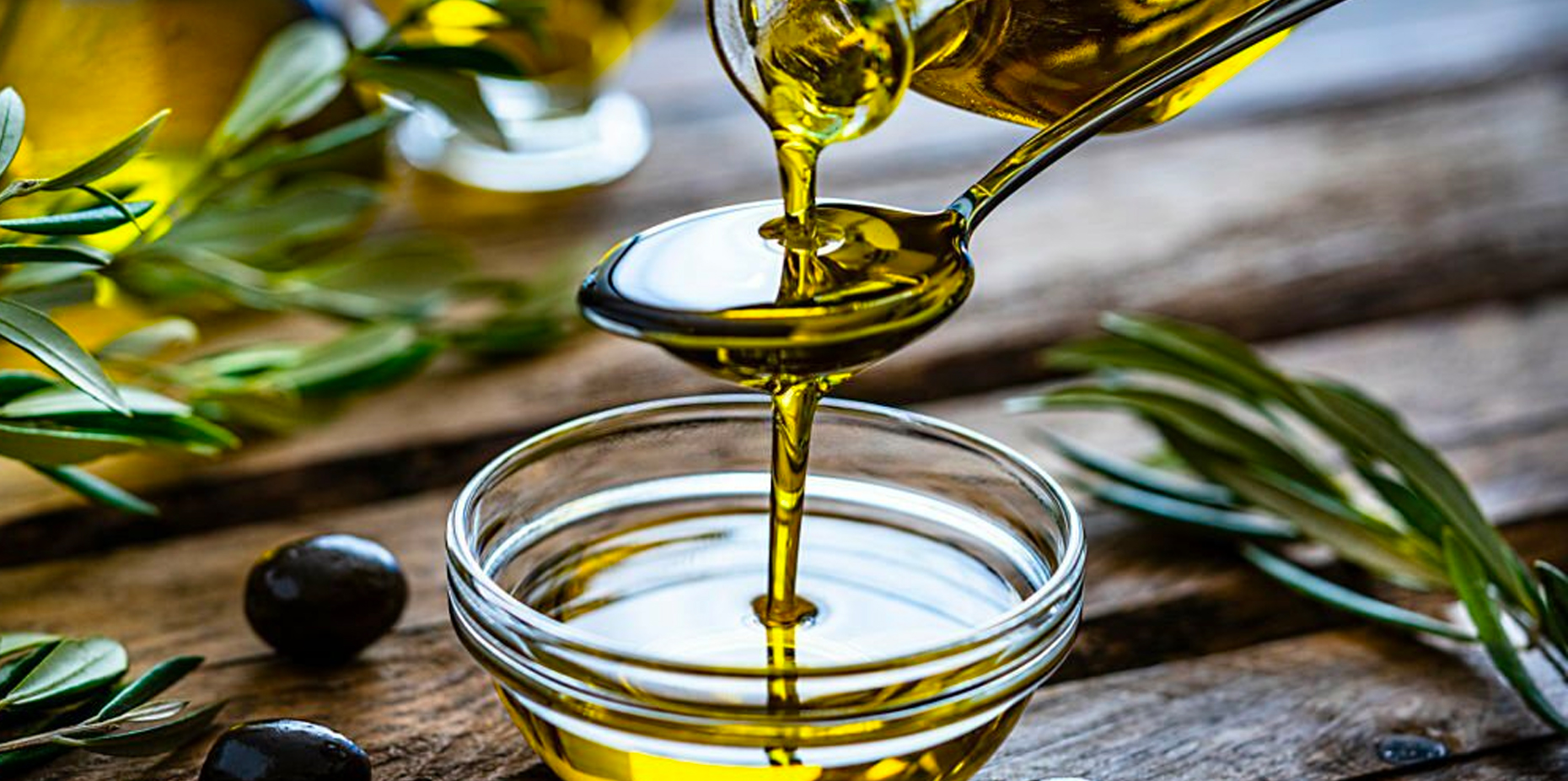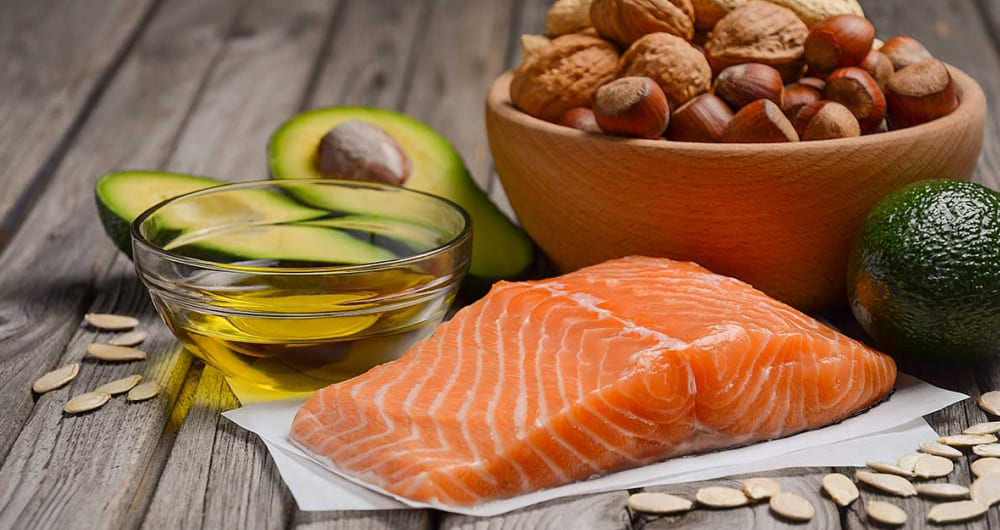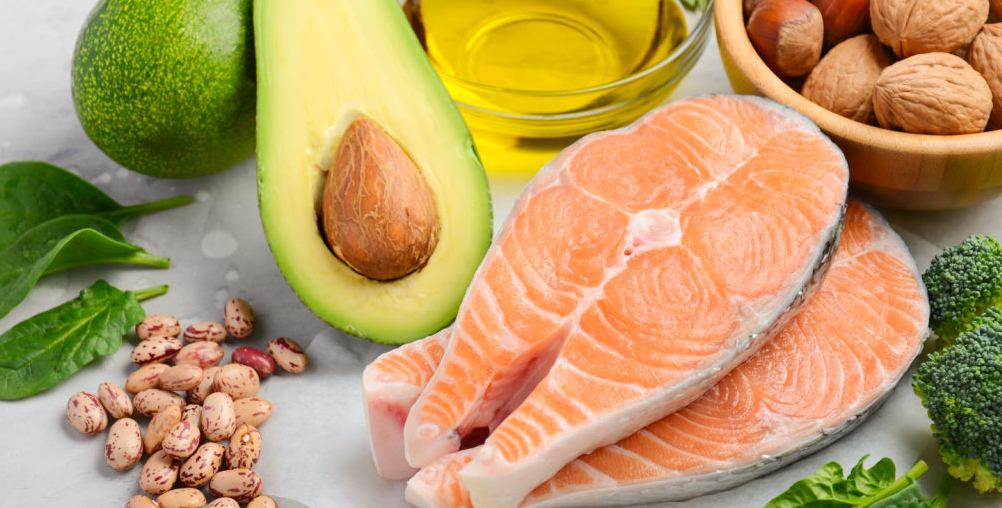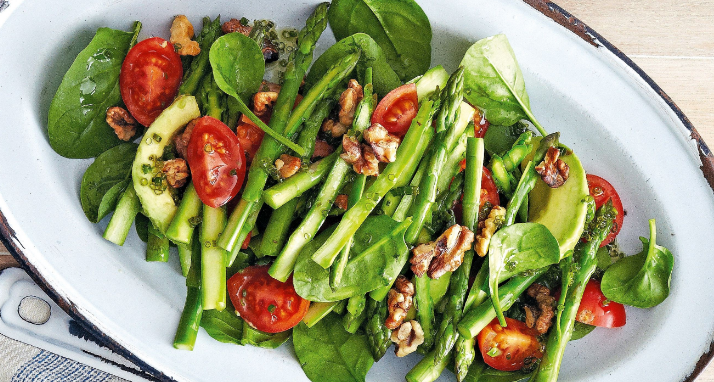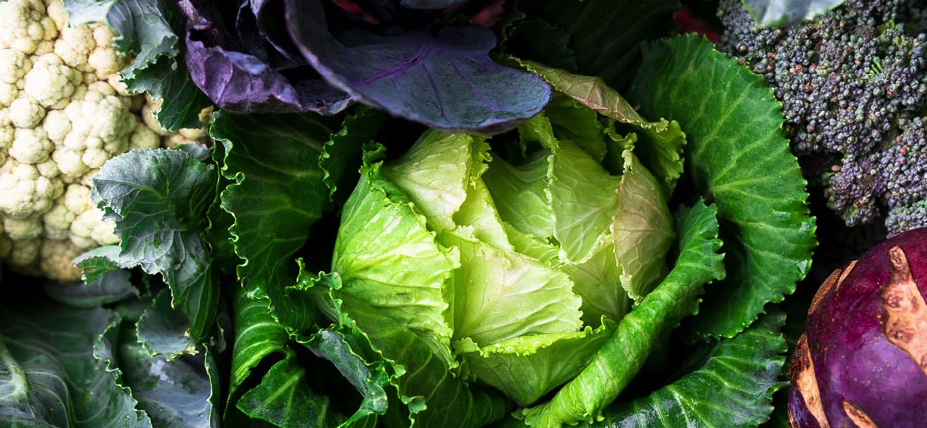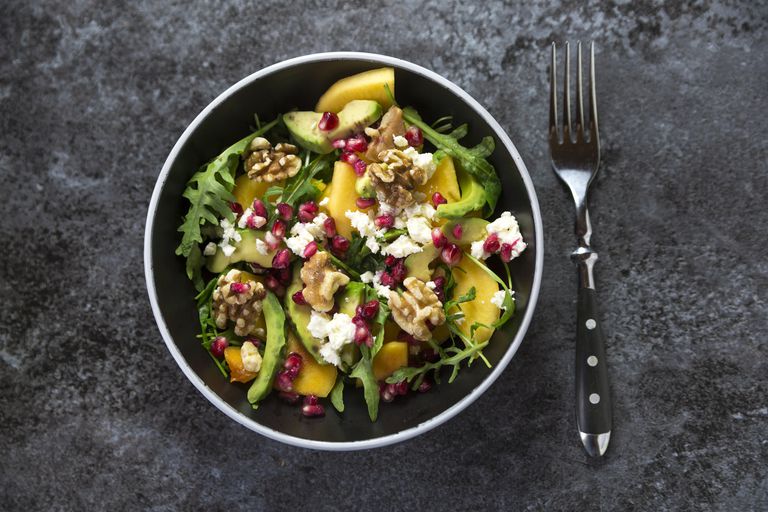Olive oil is one of the best ingredients that you can keep in your kitchen cupboard.
Not only is it easy to use in any recipe and cooking method, but it is also high in nutrients. Olive oil is rich in flavor and provides a ton of health benefits.
Keep reading to find out all you need to know about olive oil.
Fun Fact:The first ever eyeshadow was made using ground-up charcoal and olive oil.
Table of Contents
History & Facts
Olive oil is a type of liquid fat that comes from the oil of olives, which are the fruits of the olive tree (Olea europaea L. subsp. europaea var. europaea). Olives are a fruit that is related to mangoes, peaches, almonds, and pistachios. The olives are pressed or crushed and the oil is then extracted or separated to produce olive oil.
It is most commonly a part of the culinary world and in the Mediterranean diet, but is also popular for cosmetics, pharmaceuticals, soaps, and religious purposes (1).
Olive oil has been used as a common ingredient for thousands of years, but it is not clear when and where olive trees were first domesticated (2). Some evidence has found them present at around 4000 BC. Olive oil was included in ancient Greek and Roman cuisine and medicine. It was even used as a form of birth control at one point.
Several grades of olive oil are available today, all of which vary depending on nutritional content and amount of processing. The three main grades of olive oil include refined olive oil, virgin olive oil, and extra virgin olive oil. Extra virgin olive oil has the least amount of processing and is one of the healthiest types of olive oil out there (3). It is most often part of research studies and known for the most potent health benefits.
These days, world production of olive oil from 2016 to 2021 was around 3.4 million tons, with Spain being the largest producer and Greece being the largest consumer, followed by Spain and Italy (4).
Summary:Olive oil is made by crushing or pressing olives and extracting the oil. Extra virgin olive oil is considered the least processed and has potential health benefits.
Nutrition Facts
Olive oil is one of the most nutrient-dense oils out there.
Macronutrients
In one tablespoon of extra virgin olive oil, there are the following macronutrients (5):
- Calories: 126 calories (kcal)
- Protein: 0 grams (g)
- Total fat: 14 grams (g)
- Saturated fat: 2.17 grams (g)
- Monounsaturated fat: 9.58 grams (g)
- Polyunsaturated fat: 1.3 grams (g)
- Carbohydrate: 0 grams (g)
- Fiber: 0 grams (g)
Olive oil is a source of essential nutrients like polyunsaturated fats such as omega-3 fatty acids, which play a role in maintaining brain health (6). Omega-3 fatty acids support brain cell structure and may help reduce the risk of depression and anxiety (7). Olive oil is also rich in monounsaturated fats, which are brain and heart-friendly fats. These fats help build and maintain cell membranes in the brain, supporting communication between brain cells.
Summary:Olive oil is high in calories and healthy fats, like mono- and polyunsaturated fats. These fats are important for brain and heart health.
Vitamins & Minerals
In one tablespoon of extra virgin olive oil, there are the following vitamins and minerals (8):
- Calcium: 0.14 milligrams (mg)
- Potassium: 0.14 milligrams (mg)
- Choline: 0.042 micrograms (mcg)
- Sodium: 0.28 milligrams (mg)
- Vitamin E: 2.93 milligrams (mg)
- Vitamin K: 3.64 micrograms (mcg)
Olive oil is a large source of vitamin E (9). This vitamin not only fights off free radicals but also supports healthy skin, nails, and hair. Furthermore, olive oil contains a good amount of vitamin K (10). Vitamin K plays an important role in bone health, and heart health, and is a key component of blood clotting (11).
Extra virgin olive oil is also a great source of antioxidants and anti-inflammatory agents, both of which can help fight inflammation and common chronic diseases.
Summary:Olive oil contains nutrients like vitamin E, vitamin K, and antioxidants, all of which support health and can help decrease inflammation and the risk of chronic disease.
Health Benefits
Olive oil is most commonly known for all of its health benefits, keep reading to find out a few of them.
Antioxidant Protection
Free radicals can damage your cells and DNA, leading to aging, chronic diseases, and even cancer (12). But don’t worry, olive oil’s got your back! Olive oil is rich in natural antioxidants, such as vitamin E and polyphenols. These powerful compounds work tirelessly to neutralize free radicals and prevent cell damage. Think of them as your body’s defense system, guarding your health on a cellular level.
One of the key players in olive oil’s antioxidant lineup is vitamin E (13). This vitamin not only fights off free radicals but also supports healthy skin, nails, and hair. So, by incorporating olive oil into your diet, you’re not just protecting your cells; you’re also giving your appearance a natural glow.
Olive oil’s antioxidants play a crucial role in strengthening your immune system. They help your body fend off infections and illnesses, keeping you feeling your best year-round. Consuming olive oil regularly is also linked to a lower risk of heart disease (14). The antioxidants help reduce inflammation in your blood vessels, preventing plaque buildup and maintaining a healthy blood flow (15).
Moreover, the antioxidants it contains can help reduce bad cholesterol levels and lower blood pressure. This, in turn, reduces the risk of heart disease and stroke, keeping your ticker in top shape. A happy heart means a happier you!
Summary:Olive oil is rich in antioxidants that can help neutralize free radicals and prevent cell damage, decreasing the risk of prevalent chronic diseases.
Cognitive Function
Consuming olive oil regularly may enhance memory and cognitive skills. It promotes better blood flow to the brain, which can boost memory retention and mental clarity. Olive oil is a source of essential nutrients like omega-3 fatty acids and vitamin K, both of which play a role in maintaining brain health (16). Omega-3s support brain cell structure, while vitamin K aids in cognitive function. Omega-3 fatty acids in olive oil may even help regulate your mood, reducing the risk of depression and anxiety (17). A happier brain means a healthier you!
Olive oil is also rich in monounsaturated fats, which are brain-friendly fats. These fats help build and maintain cell membranes in the brain, supporting communication between brain cells. Studies suggest that a Mediterranean diet rich in olive oil may lower the risk of cognitive decline as you age. It helps protect brain cells and promotes healthy neural pathways.
Summary:Consuming olive oil can be a great way to boost brain health, due to the healthy fats it contains like monounsaturated fats.
Cancer Prevention
The antioxidants in olive oil may safeguard your DNA from mutations that can lead to cancer (18). By maintaining the integrity of your genetic code, olive oil plays a vital role in cancer prevention. It can help regulate the cell cycle, preventing abnormal cell growth, which is a hallmark of cancer.
Olive oil has been found to encourage apoptosis, a natural process where old or damaged cells self-destruct. This helps eliminate potentially cancerous cells from your body before they can cause harm.
Studies suggest that regular consumption of olive oil may reduce the risk of colon cancer. Its protective effects on the colon lining are thought to be responsible for this benefit.
Some research indicates that olive oil, as part of a Mediterranean diet, may lower the risk of breast cancer. The monounsaturated fats in olive oil could play a role in this protective effect.
Olive oil may help regulate hormones in the body. Hormonal imbalances can contribute to the development of certain cancers, and olive oil’s role in hormone regulation can be a preventive measure.
Summary:Research suggests that olive oil contains properties that may prevent certain types of cancers in the body.
Ways to Consume
Olive oil is one of the most common cooking oils around, and it is one of the three food staples used in the Mediterranean diet. It is most commonly part of salad dressing and a topper for other cold foods. It can be heated and has a high smoke point compared to other oils and is used for sautéing. Extra virgin olive oil is more stable than other vegetable oils making it a good cooking choice.
Some of the ways you can consume olive oil include the following:
- Use it as a dip for bread
- Drizzle it on pasta
- Use it as the main ingredient in salad dressing
- Use it for baking recipes like making bread
- Drizzle it on vegetables
- Mix it into hummus
- Use it in place of butter
Fun Fact:Olive trees can live for up to 2000 years.
Potential Risks
In general, the benefits of olive oil outweigh the risks, however, there are some potential risks to be aware of.
- May not help with weight loss: Because olive oil contains a higher number of calories in a small amount, consuming high amounts of olive oil may make it more difficult for someone aiming to lose weight (19). On the other hand, this makes olive oil a helpful dietary tool for someone who may be trying to gain weight.
- Allergy Risk: Although it is uncommon, some people report allergies to olives and olive oil (20). Some of the allergic reaction symptoms include hives, stomach cramping, trouble swallowing, swelling, and/or dizziness. Consult a medical professional if any of these symptoms occur when consuming olive oil.
Summary:Olive oil may not help people who are trying to lose weight and may cause allergic reactions for some.
Frequently Asked Questions
Does heating olive oil make it toxic?
During cooking, fatty acids in oil can oxidize. This can cause damage and make them toxic. Olive oil, however, has a high smoke point of around 376 degrees Fahrenheit and is safe for most cooking methods including frying. This means that olive oil seems to be very safe, even for cooking at moderate temperatures.
Can olive oil be a substitute for other oils in cooking?
Yes, for most recipes olive oil can be swapped for other types of oils, including coconut oil, vegetable oil, and canola oil. Keep in mind that olive oil may have a stronger flavor than other oils.
What is cold-pressed olive oil?
Olive oil is cold-pressed when its temperature during the extraction process never climbs above 81.9 degrees Fahrenheit. Temperatures are kept low to preserve the natural aroma and flavor of the olives and maintain the nutritional value of the finished product.
Did You Know?:Each olive tree can produce around a gallon of olive oil at the time of harvest.
Conclusion
Olive oil is jam-packed with healthy fats like mono- and poly-unsaturated fats. It also contains a high number of nutrients like vitamin E, vitamin K, and antioxidants.
This precious oil has a high number of health benefits like decreasing the risk of cancer, improving cognitive function, and providing protection from chronic diseases.
Olive oil is versatile in the kitchen and can be consumed in a variety of ways in recipes, and breads, and is a staple in the Mediterranean diet.



